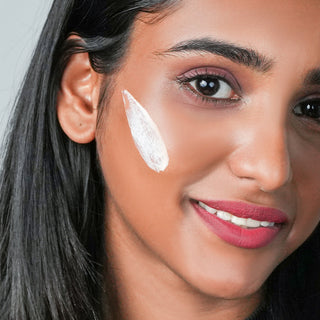Table of content
If you have acne, sunscreen might be the last thing you feel like using. It’s common to skip it, thinking it will make your skin more oily, clog your pores, or make breakouts worse. But the truth is that sunscreen is a must—even for acne-prone skin.

In fact, using the right sunscreen can help prevent more breakouts, reduce inflammation, and even fade dark spots left behind by pimples. The key is to choose a sunscreen that’s non-comedogenic—meaning it won’t clog your pores—and suits your skin type.
Let’s break down why sunscreen matters for acne-prone skin, what ingredients to look for, and which product might be the best fit for your skin.
Why Acne-Prone Skin Needs Daily Sun Protection
1. UV Rays Make Acne Worse
Sun exposure can dry out your skin at first, but it quickly leads to more oil production—causing more clogged pores and breakouts. If your skin is already irritated or inflamed, UV rays can make it worse.
2. Post-Acne Marks Can Get Darker
Sun exposure increases melanin production, which can make dark spots left over after pimples have healed (also called PIH – post-inflammatory hyperpigmentation) even more noticeable and harder to fade.

3. Your Skin Barrier Is Already Weakened
Acne-prone skin often has a damaged skin barrier, especially if you're using treatments like salicylic acid or retinoids. UV rays can damage it even more, leading to irritation, peeling, or long-term sensitivity.
What Is a Non-Comedogenic Sunscreen?
A non-comedogenic sunscreen is designed not to block pores. These formulas are lighter and made specifically to avoid triggering breakouts.
Look for these features:
- Fragrance-free to reduce the risk of irritation
- No heavy occlusive oils (like coconut oil or cocoa butter)
- SPF 30 or higher for daily protection
- Soothing ingredients like niacinamide, centella, or panthenol
Which Sunscreen Should You Use for Your Acne-Prone Skin?
Every acne journey is different. Some people have oily skin, while others have dryness or sensitivity alongside acne. All AccuFix sunscreens however, have been created to be suitable for all skin types, including oily and acne-prone skin. They do however, differ in their texture and budget to cater to the unique personal preferences of our customers.
Here how to choose the best sunscreen for you:

The Ultimate Sunscreen SPF 50+
- Silicone gel base that helps to control oil production
- Primer-like finish that works exceptionally well under makeup
- No pore-clogging ingredients
- No white-cast
- State-of-the-art UV filters that provide lasting broad-spectrum sun protection
Invisible Shield With Centella SPF 50+
- Centella Asiatica calms inflammation
- Niacinamide brightens and repairs
- Hydrating, water-based texture that doesn’t feel heavy
- Free from dyes, fragrances, and other known irritants
- No white-cast
- Doubles as your morning moisturiser
Daily Defence SPF 30+
- Affordable daily protection
- Light and breathable
- No white cast
- Safe for all skin types
- Ideal for those with limited sun exposure or those on a tighter budget
How to Use Sunscreen on Acne-Prone Skin
- Start with a clean face. If you use acne treatment products (like serums or spot treatments), apply those first and let them absorb.
- Use the two-finger method (index and middle finger full of sunscreen) to cover your entire face.
- If you're outdoors or sweating, reapply every 2 hours to maintain consistent protection.
- Use a gentle cleanser at night to wash off sunscreen fully—especially if you’re prone to clogged pores.
Conclusion: Protect Your Acne-Prone Skin the Right Way
Sunscreen doesn’t have to cause breakouts. With the right non-comedogenic sunscreen, you can protect your skin from the sun without clogging your pores or adding oiliness.
Choose the one that fits your skin—and make daily sun protection a habit, even when you’re breaking out.

